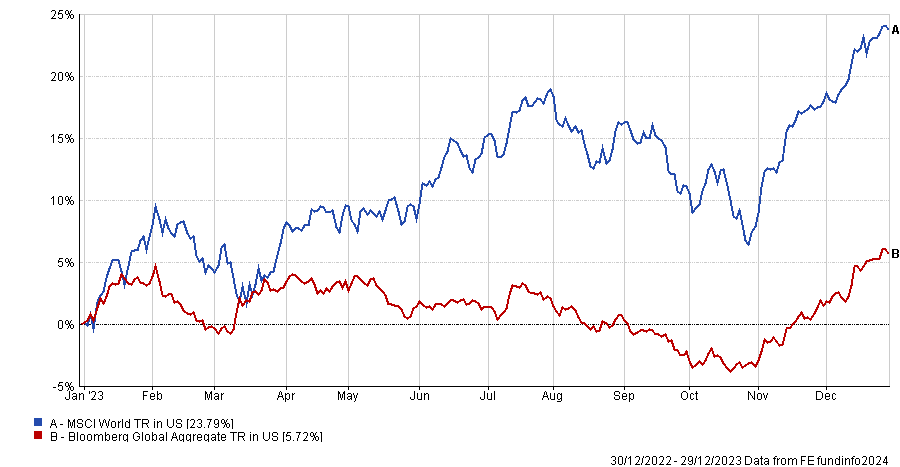Equities are likely to perform better in the first half of this year than the second, the US Federal Reserve will take a hawkish tone, market concentration will recede, investors will diversify out of cash and at least one major election result could surprise. These are Invesco’s chief market strategist Kristina Hooper’s five predictions for 2024.
Initially, Hooper thinks exuberance that central banks have reached peak rates will continue propelling the equity and bond rallies which began late last year, as the chart below shows.
Equity and bond markets rallied at the end of last year (in dollar terms)

Source: FE Analytics
“I believe data over the next several months will provide greater clarity that the US Federal Reserve will cut rates significantly this year, which should be supportive of equities and fixed income,” Hooper said. “In other words, I think the first half of 2024 will largely be a continuation of the last few months of 2023 albeit with more volatility.”
Equity markets could give back some of their gains in the second half of this year, however, as they start to discount a slowdown in 2025.
Although Hooper is expecting substantial rate cuts eventually, she also thinks the US Federal Reserve will take a hawkish tone early this year as it seeks to keep a lid on inflation and monetary easing.
As Dallas Fed President Lorie Logan said in a recent speech: “Restrictive financial conditions have played an important role in bringing demand into line with supply and keeping inflation expectations well-anchored. We can't count on sustaining price stability if we don't maintain sufficiently restrictive financial conditions.”
Hawkish narrative from the Fed – which higher than expected US consumer price inflation yesterday reinforces – could drive bond yields higher and risk assets lower, so investors should brace themselves for turbulence.
Even so, the recent market rally illustrated that investors staying on the sidelines in high-yielding cash accounts and money market funds could be missing out on larger gains elsewhere. Cognisant of the opportunity cost, Hooper expects investors to move out of cash into bonds and equities and to diversify their portfolios.
Last year’s gains may have been concentrated amongst a handful of technology superstars but this year, Hooper expects returns to be spread more broadly and some neglected asset classes to rebound. “I’m most excited about small-cap equities, as well as emerging markets equities and emerging markets bonds,” she said.
Last but not least, in a year when the world’s three largest democracies and half the global population heads to the polls, Hooper thinks at least one election will have a surprising outcome – although she added that over the long run, elections do not have much impact on financial markets.
Hooper has also drawn five key lessons from 2023 which will be brought to bear this year.
First, central banks were quick to respond to the US regional banking crisis in March 2023 and to turmoil in the UK gilt market caused by Trussonomics in 2022, so it is reasonable to assume they will be on the lookout for cracks caused by their recent hiking cycle.
“I’m optimistic that policymakers will remain vigilant and quickly react to any issues that arise from the aggressive tightening that many central banks have engaged in, recognising the long and variable lags of monetary policy,” Hooper stated.
Second, what the Fed says it is going to do and what it actually does are two different things. “Many central bankers have maintained a hawkish public face even as substantial progress on disinflation continues,” Hooper explained. “And so while the most recent ‘dot plot’ indicates the Fed expects to cut rates by 75 basis points in 2024, I believe the Fed will likely cut between 100 and 150 basis points (of course depending on the data).”
The third related lesson is that monetary policy had an outsized impact on markets last year and we are still in a “hyper rate-sensitive environment”.
Looking elsewhere, Hooper expected a strong rebound in China when it reopened after the pandemic lockdown. She was proved wrong because “I didn’t factor in the possibility that business and consumer sentiment would be tepid because of concerns about adequate stimulus”.
On the flip side, if Chinese businesses and consumers become more comfortable with monetary policy going forward then sentiment could improve quickly.
Hooper said this experience has brought home her fourth lesson: “Don’t underestimate the power of psychology in impacting an economy.”
Finally, diversification remains as important as ever, not least because many economists were wrong about their predictions for 2023.




